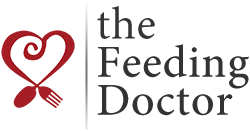Mom, what's a "diet?" Dealing with the "D-word"

Sunday morning I'm reading comics to my daughter and found again that there were at least three that I had to "edit." (Pretty typical for the 'comics' these days.) One was about gastric bypass (the snowman missing the middle ball) another, "Do these pants make my tentacles look fat," and another about dieting. It brought back a comment a reader wrote after my last post.
"I'm livid that we live in a world where a 4 year old is already getting messages about what is and isn't acceptable in terms of body size and food choices! I thought I wouldn't have to start fighting this until about age 10 (which is when I unfortunately discovered dieting).
My 4 year old daughter brought home a "learn to read" book about being healthy...I saw "eat lots of fruits and vegetables"--okay, I can live with that. And "get exercise"--okay. But there it was on page 4: "eat only a little bit of fat" Argh! My daughter was puzzled--what's fat? Why can't I eat it?...
And then a week ago one of the teenage instructors at the ice rink told my daughter that if you eat a lot of pizza you'll get fat (I have no idea what the context was). Suddenly my intuitive eating child is questioning her choices. (read my comments on the blog for my reaction to this gem of an ice-skating teacher...)
So the question is, when the topic comes up how do I talk about dieting in a way that does not encourage the behavior?"
And then a week ago one of the teenage instructors at the ice rink told my daughter that if you eat a lot of pizza you'll get fat (I have no idea what the context was). Suddenly my intuitive eating child is questioning her choices. (read my comments on the blog for my reaction to this gem of an ice-skating teacher...)
So the question is, when the topic comes up how do I talk about dieting in a way that does not encourage the behavior?"
Remember, we're talking about four-year-olds here- they are pretty unsophisticated. (I remember working at a summer camp and getting the kids ready for swim time. The 3 and 4 year olds were all running around naked and one kid had underwear on and they all teased him, "I see your underwear!") My first advice is "EDIT" when possible (notice it's an anogram?) As much as possible, try to edit, or not expose them to notions of dieting, weight loss etc. But, as my reader noted, it is near impossible in the world we live in.
First, when a child asks you about a diet, or fat, or Weight Watchers, ask them what they think. You may learn that they are not really that clued in, or that there is something that you can clarify. EDIT your answer, a 4 year-old doesn't get the complexities, and you need to be careful not to confuse with too much information. Try to stay neutral and pleasant during the conversation. If you are unable, because of issues with the D-word, ask a partner, or trusted adult to take on the issue. Again, a few sentences might be all it takes. I would also be careful not to lie.
Here are a few ideas, then I'd love to hear from you all.
On the topic of eating fat, you could say,
"That book is wrong, and we know better now. Fat is good to eat, we need to eat fat to live. Avocados, nuts, ice-cream, salad dressing and butter have fat in them. Fat can taste pretty yummy! We're lucky we get to eat lots of different foods, including fat."
On "dieting,"
"It means that people don't eat as much as they want, or the foods that they want to eat. They might feel hungry allot. I wouldn't like to feel hungry all day. We don't eat that way in our family. We eat when we are hungry and stop when we have had enough."
or
"It means that you don't listen to your tummy to decide how much or what foods to eat. When people diet, even if they are hungry, they might not eat. That's not good for your body. A good way to eat is to eat when you are hungry and stop when you have had enough, and to enjoy lots of different kinds of foods like we do!"
Ask your child if that makes sense, and then move on, change the topic.
Older kids will have more of a framework and logical thinking to explore the topic further and I will address that in a future post. I am not a child psychologist, but just a few thoughts! I'd love to hear what you think. It's a great exercise to have the words ready for when the inevitable questions come up... Am I way off base? How have you handled this?
